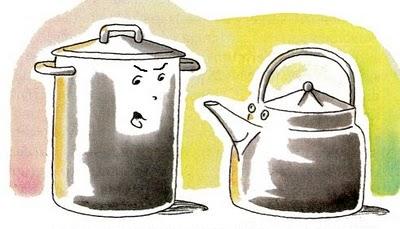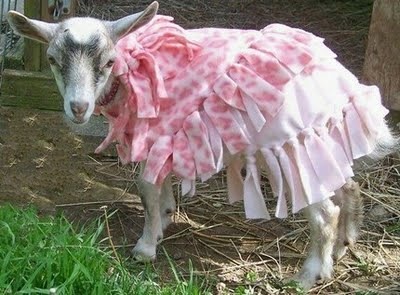Quand le Chat N’est Pas Là…Worldwide Proverbs
 “It’s the pot calling the kettle black.” “You can lead a horse to water, but you can’t make him drink.” “When the cat’s away, the mice play.” Proverbs in any language are a fascinating and catchy way to get an idea of that culture’s notions of human nature, ethics, and what’s important in life. They can also be a good way to get to know people—while I was studying abroad, my go-to icebreaker at parties was to ask students to teach me proverbs in their language. (To this day all I remember is the French saying, l’herbe est toujours plus verte ailleurs, which translates pretty neatly into our “grass is greener” proverb.)
“It’s the pot calling the kettle black.” “You can lead a horse to water, but you can’t make him drink.” “When the cat’s away, the mice play.” Proverbs in any language are a fascinating and catchy way to get an idea of that culture’s notions of human nature, ethics, and what’s important in life. They can also be a good way to get to know people—while I was studying abroad, my go-to icebreaker at parties was to ask students to teach me proverbs in their language. (To this day all I remember is the French saying, l’herbe est toujours plus verte ailleurs, which translates pretty neatly into our “grass is greener” proverb.)
I’ve always been interested in collecting proverbs, especially ones that vary ever so slightly from the English versions. For example, virtually every Italian proverb seems to use bread or other comestibles as an analogy for life and the human condition. Non e’ pane per i miei denti (literally: it’s not bread for my teeth), is their way of saying, “It’s not my cup of tea.” The saying a tavola non si invecchia, (literally: at the table one doesn’t get old) illustrates the important role friends, family, and food play in Italian culture, claiming that time doesn’t pass when one is sharing a good meal with good people.
 Proverbs often serve as miniature fables, using animals to teach us important life lessons. Take the Afrikaans Al dra ‘n bobbejaan ‘n goue ring, bly hy nog ‘n lelike ding; while it literally means, “Even if a baboon wears a gold ring, he’s still an ugly thing,” it’s actually referring to people who think they can change who they are by altering their appearance—don’t be fooled! (Similar to the Irish Cuir síoda ar ghabhar agus is gabhar i gcónai é—if you put silk on a goat, it’s still a goat.) Estonian has the saying Vana karu tantsima el õpi, which means, “An old bear will not learn to dance,” much like English has, “You can’t teach an old dog new tricks.” Romanian’s Nu vinde pielea ursului din pădure (literally: don’t sell the skin from the bear in the forest), corresponds roughly to the English “don’t count your chickens before they’ve hatched.”
Proverbs often serve as miniature fables, using animals to teach us important life lessons. Take the Afrikaans Al dra ‘n bobbejaan ‘n goue ring, bly hy nog ‘n lelike ding; while it literally means, “Even if a baboon wears a gold ring, he’s still an ugly thing,” it’s actually referring to people who think they can change who they are by altering their appearance—don’t be fooled! (Similar to the Irish Cuir síoda ar ghabhar agus is gabhar i gcónai é—if you put silk on a goat, it’s still a goat.) Estonian has the saying Vana karu tantsima el õpi, which means, “An old bear will not learn to dance,” much like English has, “You can’t teach an old dog new tricks.” Romanian’s Nu vinde pielea ursului din pădure (literally: don’t sell the skin from the bear in the forest), corresponds roughly to the English “don’t count your chickens before they’ve hatched.”
And then there are some proverbs that are so bizarrely specific that one can’t help but think they must be very wise indeed, such as the Indonesian Kuman di seberang lautan tampak, gajah di pelupuk mata tak tampak, which translates, “The bacterium across the sea is seen, but the elephant on the eyelid is not seen,” referring to someone who hones in on others’ mistakes while ignoring their own. (A korinthenkacker, if you will.) Or the Yiddish Ven di bobe volt gehat reder, volt zi geven a trolleybus(ווען די באבע וואלט געהאט רעדער, וואלט זי געווען א טראלייבוס), translating to the nonsensical, “If grandma had wheels, she’d be a trolleybus” –a vague reflection of the English nursery rhyme, “If if’s and and’s were pots and pans, we’d have no need for tinkers,” meaning don’t waste time imagining impossible situations and focus instead on what you have. Or the Russian Lyubov’ zla, polyubish’ i kozla, which translates to, “Love is evil; you will fall in love with a goat,” and is a somewhat more ominous way of saying that love is blind.
Some proverbs go back so far their origins are lost in tradition, but no matter how old they are, they are sure to paint a poignant and often amusing picture of human nature. Proverbs are a crucial aspect of oral history and folklore; motherly advice of the ages offering us wisdom and poetry to get us through everyday situations. After all, as it is said in Arabic, “A proverb is to speech what salt is to food.”
What are some of your favorite proverbs?
